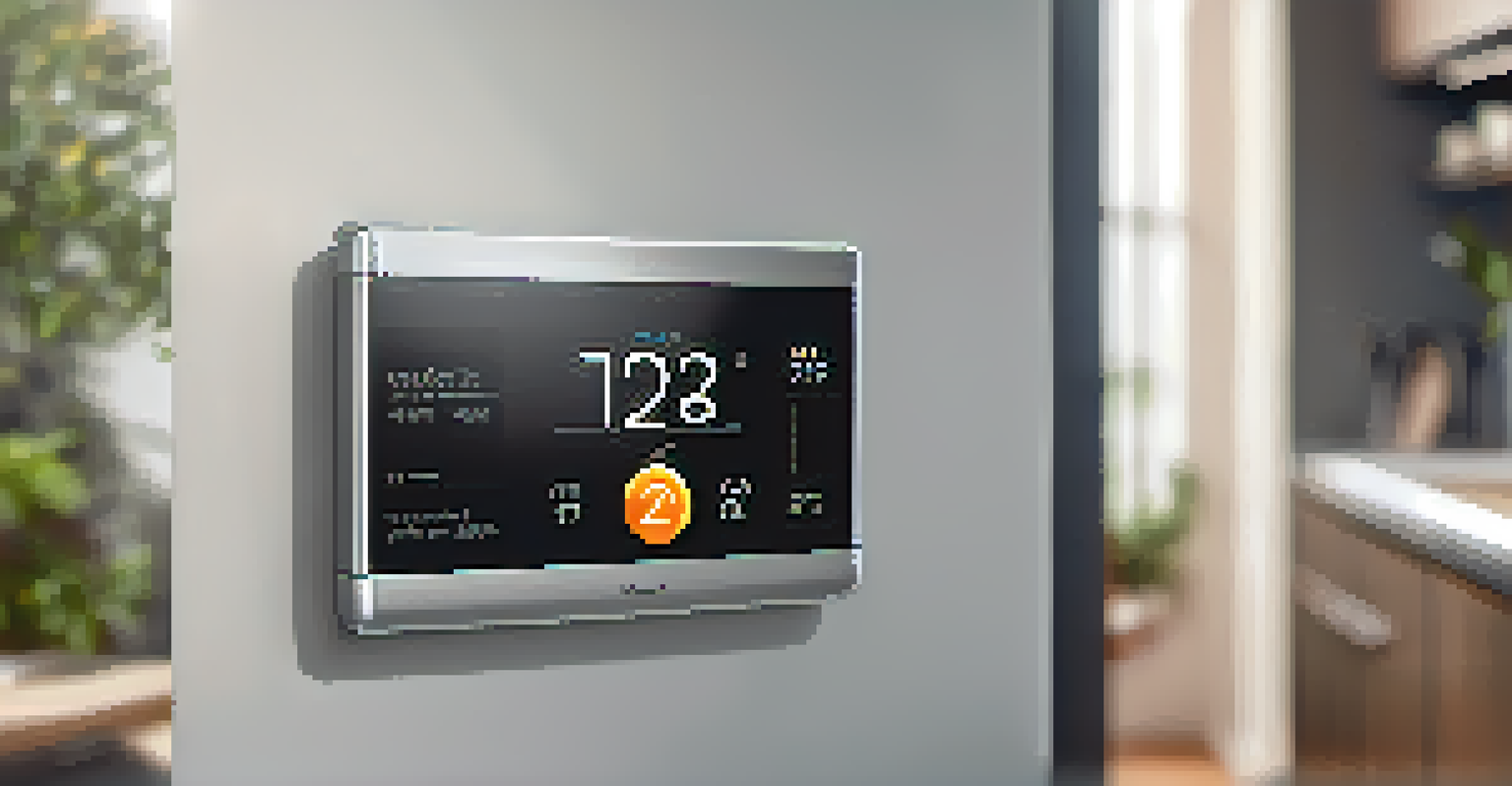Reducing Energy Costs Through Intelligent Home Automation

Understanding Home Automation and Its Benefits
Home automation refers to the technology that allows you to control various systems in your house, such as lighting, heating, and security, from a centralized device. Imagine being able to adjust your thermostat or turn off lights with just a tap on your smartphone. This convenience not only enhances your lifestyle but can also lead to significant savings on energy costs.
The future is not something we enter. The future is something we create.
By automating your home, you can create schedules for appliances and systems to run only when needed. For instance, programming your thermostat to lower the temperature during the night can help you save on heating bills. Additionally, many smart devices learn your habits and adjust automatically, ensuring that energy is not wasted.
Moreover, home automation can also improve your home's energy efficiency. Smart sensors can detect when rooms are occupied or empty, ensuring that lights and heating only operate where necessary. This level of control means you can enjoy comfort while being more mindful of your energy consumption.
Smart Thermostats: A Game Changer for Energy Savings
One of the most impactful smart home devices is the smart thermostat. Unlike traditional thermostats, these devices can learn your schedule and adjust heating or cooling accordingly. Picture coming home to a perfectly comfortable house without having to leave the heat or air conditioning running all day.

Smart thermostats can be controlled remotely through mobile apps, allowing you to adjust settings while you're away. For example, if you leave for a weekend trip and forget to turn down the heat, you can do it from your phone. This not only saves energy but can also lead to lower monthly bills.
Beyond just remote control and scheduling, many smart thermostats provide insights into your energy usage. They can show you how much energy you're using and suggest ways to save more. This level of awareness empowers you to make informed decisions about your heating and cooling habits.
Lighting Control: Bright Ideas for Energy Savings
Smart lighting systems allow you to control your lights from anywhere, helping you save energy effortlessly. You can set timers or schedules for your lights, ensuring that they are only on when needed. Imagine the peace of mind knowing you can turn off lights left on at home, no matter where you are.
Technology is best when it brings people together.
Additionally, smart bulbs often use LED technology, which is far more energy-efficient than traditional incandescent bulbs. By switching to smart LED bulbs, you not only reduce energy consumption but also enjoy a longer lifespan for your lighting. This means fewer replacements and even more savings over time.
Moreover, smart lighting can enhance your home's ambiance while being energy-conscious. With features like dimming and color adjustments, you can create the perfect atmosphere for any occasion—all while keeping energy costs low.
Energy Monitoring: Keeping Tabs on Usage
An essential part of reducing energy costs is understanding your usage patterns. Energy monitoring systems provide real-time data about how much energy each appliance consumes. Think of it as having a fitness tracker for your home, helping you identify energy hogs and adjust accordingly.
These systems often come with user-friendly apps that give you insights into your energy habits. For instance, you might discover that your old refrigerator uses more energy than you realized. Armed with this information, you can make informed decisions, like upgrading to a more efficient model.
By keeping tabs on your energy consumption, you can set goals and track your progress. This proactive approach not only helps reduce costs but also fosters a more sustainable lifestyle, contributing to a greener planet.
Smart Appliances: Efficiency at Your Fingertips
Smart appliances are designed to use energy more efficiently than their traditional counterparts. From refrigerators that adjust their cooling levels based on usage to washing machines that optimize water and power usage, these devices offer modern solutions to common energy problems. Imagine a dishwasher that knows the best cycle based on the load size.
Many smart appliances can also be controlled remotely, allowing you to start or stop them from anywhere. You could set your washing machine to run during off-peak hours when energy rates are lower, providing substantial savings on your utility bills. This feature demonstrates how convenience and savings can go hand in hand.
Additionally, smart appliances often provide maintenance alerts, ensuring they operate efficiently over time. By addressing issues early, you can avoid costly repairs and maintain the energy efficiency of your home.
Creating a Smart Home Ecosystem for Maximum Savings
Integrating various smart devices into a cohesive ecosystem can amplify your energy savings. For instance, a smart thermostat can communicate with your smart lighting system to adjust settings based on occupancy. This interconnectedness means that every device can work together to optimize energy use throughout your home.
A well-designed smart home ecosystem can also simplify your daily routines. Imagine a scenario where your lights dim, the thermostat adjusts, and your coffee maker starts brewing as you wake up—all triggered by your morning alarm. This level of automation not only enhances convenience but ensures that energy is used efficiently.
To create your smart home ecosystem, consider starting with a central hub that connects all your devices. This way, you can easily manage everything from one app, making it simpler to monitor and control your energy consumption.
The Future of Home Automation and Energy Savings
As technology continues to advance, the potential for energy savings through home automation is only getting better. Innovations such as artificial intelligence and machine learning are beginning to play significant roles in optimizing energy use. Imagine a home that can anticipate your needs and adjust accordingly, making energy efficiency seamless.
New smart devices are being developed every day, which means more options for homeowners to choose from. This variety allows you to tailor your home automation system to fit your specific lifestyle and energy-saving goals. As the market grows, prices are also becoming more accessible, making intelligent home automation available to more people.

Ultimately, the future of home automation looks promising, with the potential to revolutionize how we consume energy. By staying informed about new technologies and trends, you can continue to find innovative ways to reduce your energy costs and live more sustainably.